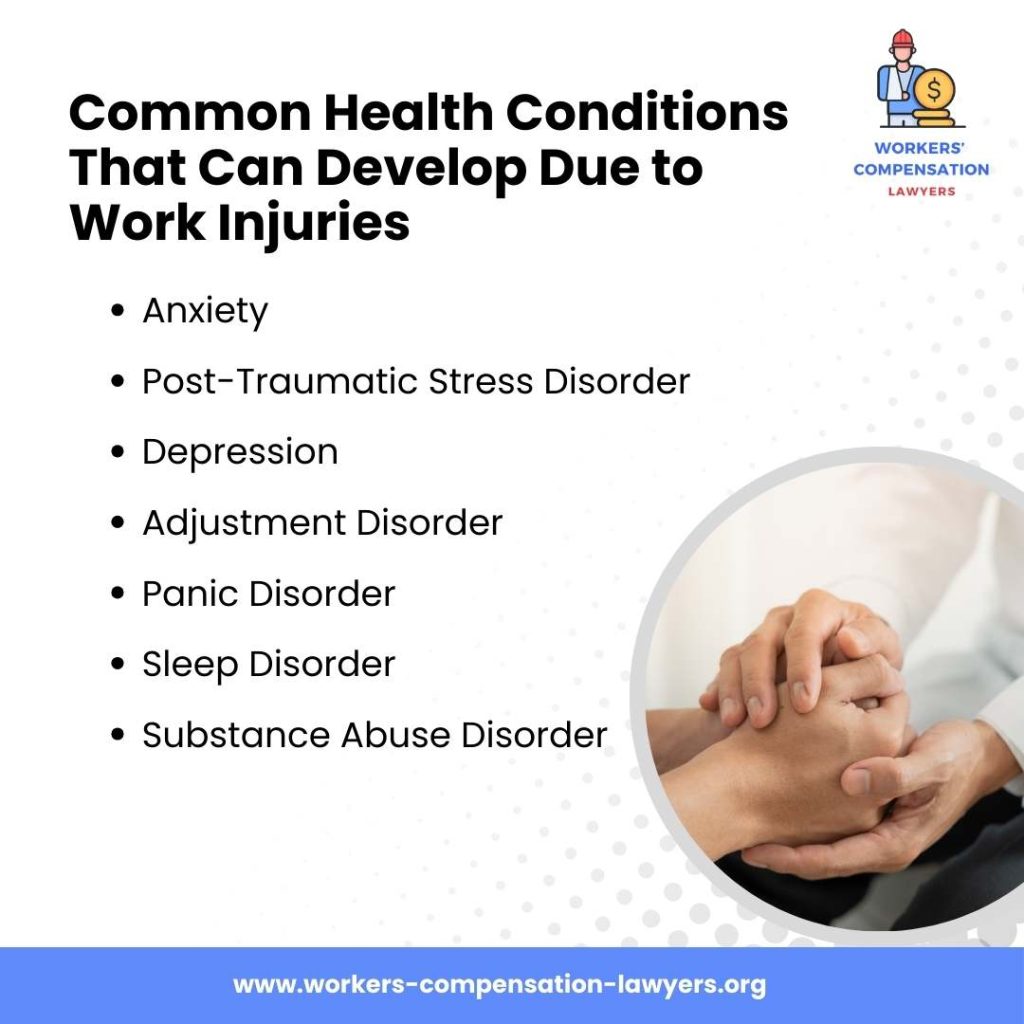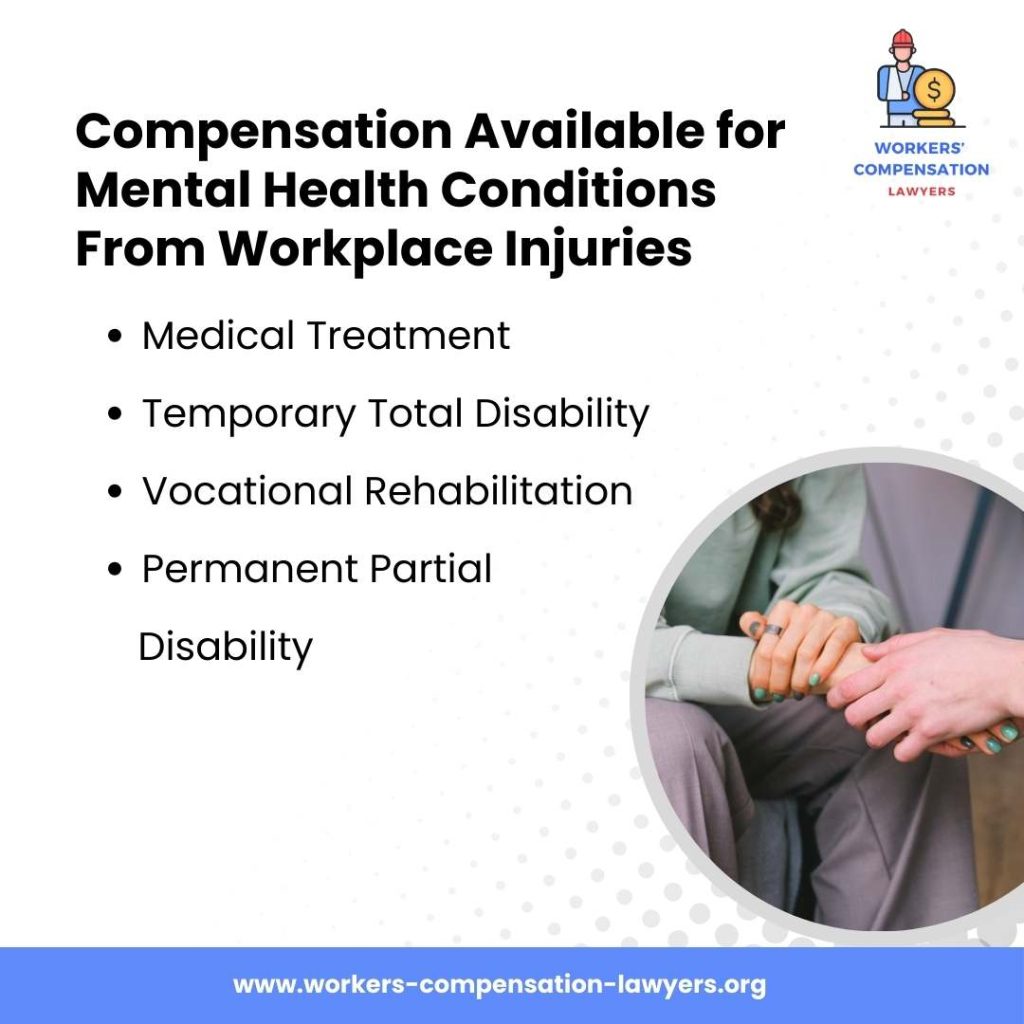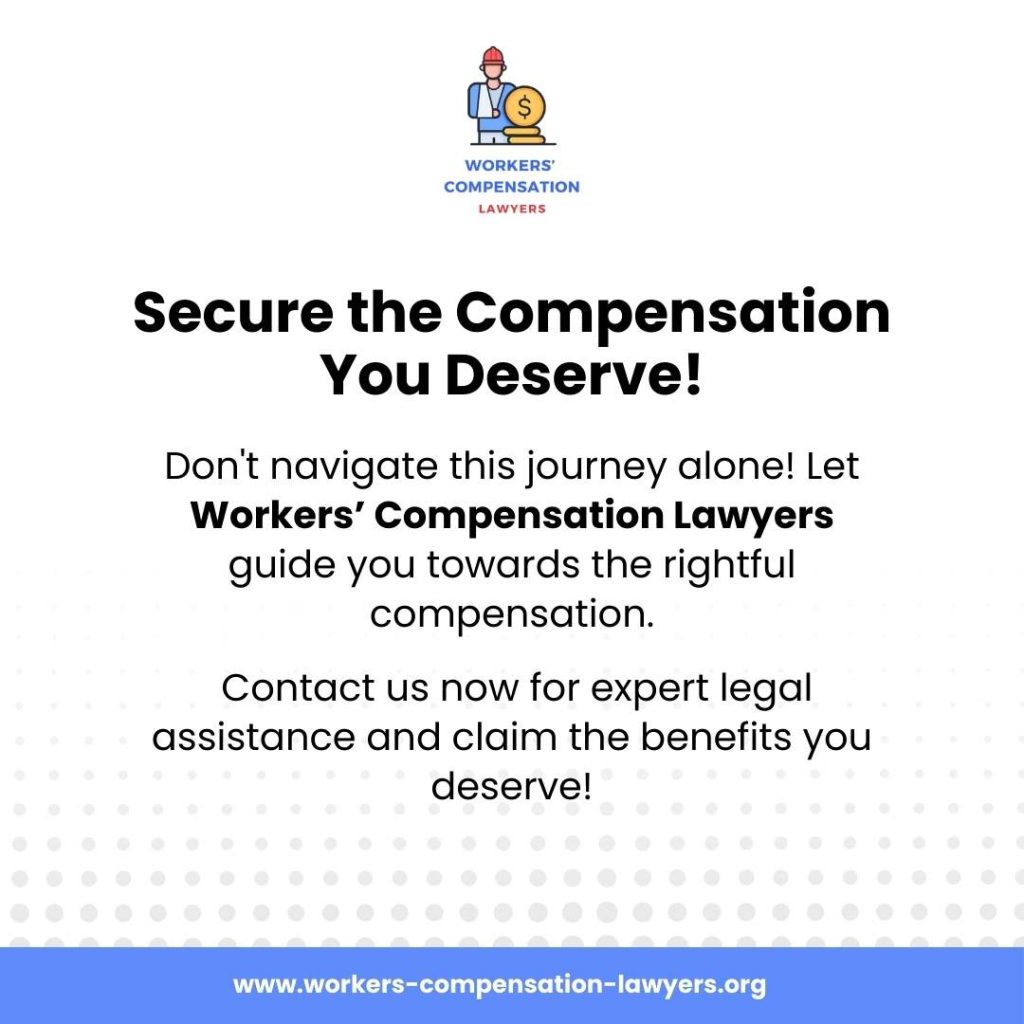
When people think of workers' compensation, they usually imagine physical injuries like broken bones, sprains, or cuts. However, there’s another crucial aspect often overlooked—mental health. Work-related incidents can cause serious mental health issues, just as debilitating as physical injuries.
Mental health conditions significantly impact the overall well-being of injured workers. These conditions can arise as a result of the injury or be pre-existing. They can profoundly affect an individual's ability to recover and return to work. In addition, they are at an increased risk of developing substance abuse disorders to cope with the physical and emotional pain they are going through.
So, how does workers' compensation handle these mental health conditions? Understanding the process is critical to getting the right support. Let’s explore this further.

A mental health condition is a disorder that affects your thoughts, feelings, mood, and behavior. Just like a physical injury can happen because of a dangerous environment at work, mental health issues can arise from stressful or traumatic situations in the workplace.
Common mental health conditions that can develop due to work injuries include:
Feeling worried, nervous, or uneasy is normal after a workplace accident. If you’ve been in such an incident, returning to work might trigger anxiety about your safety or ability to perform. Acknowledging these feelings and seeking support can help you manage stress and improve your well-being.
Depression is a mental health condition that can leave you feeling very sad, hopeless, and unmotivated. This condition may be triggered by traumatic events or prolonged work stress, impacting daily functioning and overall well-being. It's important to recognize these feelings and seek help navigating them.
PTSD is a mental health condition that can develop after experiencing or witnessing a frightening event. For example, a worker involved in or witnessing a severe workplace accident may face PTSD, impacting their daily life and mental well-being.
This condition happens when someone has trouble adjusting to a significant change, such as a severe workplace injury. Symptoms may include anxiety, depression, or other emotional distress.
Workers exposed to chronic stress or traumatic events may develop panic disorder, where they experience sudden, repeated panic attacks. These attacks can include rapid heart rate, sweating, and feelings of dread or fear.
Work-related stress or trauma can lead to sleep disorders such as insomnia or frequent nightmares. Insufficient sleep can further exacerbate mental health issues like anxiety and depression, making recovery more challenging. It’s vital to address sleep problems to improve overall well-being.
In some cases, workers might turn to drugs or alcohol to cope with the mental stress caused by a work-related incident, which can lead to substance abuse disorder.
These conditions can severely impact a person's ability to work and live normally. That’s why workers’ compensation may cover mental health treatments, but it’s essential to understand how these claims work.
These workers not only suffer from physical injuries, but they may also struggle with mental health issues that can make their road to recovery even more challenging. Let’s explore how mental health conditions can affect injured workers and the importance of addressing them for their overall well-being and triumphant return to work.
Mental health conditions can significantly delay the recovery of injured workers. The stress and trauma of the injury, along with the added pressure of financial instability and potential job loss, can lead to the development of conditions like anxiety and depression. These conditions can hinder the healing process and lead to prolonged absence from work. Additionally, workers with pre-existing mental health conditions may find it even more challenging to cope with the added stress of an injury, leading to a more extended recovery period.
Mental health conditions can also severely impact the productivity of injured workers. Symptoms of these conditions, such as fatigue, difficulty concentrating, and decreased motivation, can make it challenging for workers to perform at their usual level. This not only affects their productivity but can also hinder the productivity of their team and the overall workflow of the company.
Returning to work after an injury can be a daunting experience for injured workers. However, for those dealing with mental health conditions, this adjustment can be even more challenging. The physical limitations caused by the injury, coupled with the emotional distress of the mental health condition, can make it challenging for workers to adapt to their work environment. This can lead to a reduced ability to perform their duties, resulting in further stress and potential job loss.
Mental health conditions can also increase the risk of re-injury for workers. Workers dealing with conditions like anxiety and post-traumatic stress disorder may experience heightened levels of risk aversion and fear of re-injury. This can impact their performance and lead to a lack of confidence in performing specific tasks, ultimately increasing the risk of re-injury.
The financial burden of dealing with an injury is already substantial for workers. However, when mental health conditions are added to the mix, the economic impact can be even more significant. The costs of seeking treatment for mental health issues, along with the potential loss of income from being unable to work, can put a strain on workers and their families.
Workers' compensation benefits cover medical expenses and lost wages for work-related injuries and illnesses. This includes coverage for mental health conditions caused by work injuries, such as therapy sessions and medication. These benefits provide financial support for treatment, which can be an essential aspect of recovery for individuals struggling with mental health conditions.
For legal assistance, seek guidance from Workers’ Compensation Lawyers to start the process of obtaining the necessary compensation and care for your recovery and future well-being.

Workers' compensation provides benefits for mental health conditions caused by work-related injuries. These benefits are crucial as they help alleviate the financial burden and provide necessary support for recovery.
So, if you or someone you know is struggling with a mental health condition caused by a work injury, here are the workers' compensation benefits that may be available to help:
Workers' compensation provides coverage for medical treatment, including therapy and medication, for mental health conditions caused by workplace injuries. This ensures that the injured worker receives the necessary care to overcome their condition and return to work.
If a mental health condition has caused an employee to be temporarily unable to work, workers' compensation benefits can provide a portion of the lost wages during this time. This benefit is crucial in providing financial stability for the injured worker while they focus on their recovery.
In some cases, a mental health condition caused by a work injury may prevent an individual from returning to their previous job. In such situations, workers' compensation benefits may cover the cost of vocational rehabilitation to help the injured worker find suitable employment in a different field.
If a mental health condition has caused a permanent impairment in an individual's ability to work, workers' compensation benefits may provide compensation for the partial disability. This benefit can help offset the loss of earning capacity and provide financial support for the long term.
If you're struggling with a mental health condition caused by work injuries, you're not alone. Workers’ Compensation Lawyers, a trusted workers' compensation law firm, is here to help. Our experienced attorneys can guide you through filing Worker's Compensation Claims and Lawsuits, ensuring you get the support and benefits you're entitled to.
Our team understands the physical, emotional, and financial toll that workplace injuries can cause, so we are dedicated to fighting for your rights and maximum compensation. Don't miss out on valuable information and resources, check out our latest blogs on "How Much Does Workers Comp Pay?" and "Understanding Workers' Compensation for Temporary and Permanent Disability".
Don't suffer in silence, take the first step towards a better future and contact us today for a consultation. Let us help you get the justice and compensation you deserve.

***
The material on this site is for informational purposes only and DOES NOT CONSTITUTE THE PROVIDING OF MEDICAL ADVICE, and is not intended to be a substitute for independent professional medical judgment, advice, diagnosis, or treatment. Always seek the advice of your physician or other qualified healthcare provider with any questions or concerns you may have regarding your health.

Disclaimer: Workers-Compensation-Lawyers.org is not an attorney referral service or a law firm. Workers-Compensation-Lawyers.org does not provide legal advice of any sort. We are a free matching service, and all claim reviews will be performed by a third party attorney. We do not recommend, nor do we endorse any attorneys that pay to participate in our service. No attorney-client relationship is formed when you submit the form and you are under no obligation to retain an attorney who may contact you through this service.
How it works
FAQs
About us
Contact us